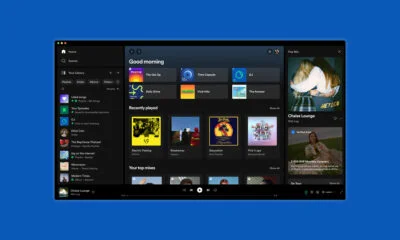News
Spotify Is Now Available In 80+ Additional Countries

Spotify, the world’s largest audio streaming platform, has recently become available in more than 80 additional countries across Asia, Africa, and the Caribbean.
Thanks to the expansion, Spotify will now be able to potentially attract as much as 1 billion new listeners, who can enjoy its growing catalog of songs and podcasts in 36 extra languages. “These moves represent Spotify’s broadest market expansion to date,” stated the Swedish company.
Currently, Spotify users from all newly supported countries have full access to the streaming platform’s global music catalog, but its podcast catalog is not yet available in certain locations. To make its services more attractive to local audiences, Spotify is determined to work with local creators and partners to expands its music offering by including regional artists.
Spotify has been with us since 2008. The service now enjoys 345 million monthly active users (155 million of which are premium paying subscribers). “For the first time ever, we have the technology to connect the world through audio,” said Chief Executive Officer Daniel Ek at an investor event known as #StreamOn.
During the event, Ek talked about Spotify’s desire to become a full-fledged audio streaming platform offering all kinds of audio content. The service is already home to around 2 million podcasts, and its audiobook library is growing at a similarly impressive pace. Spotify has also announced dozens of new original series, such as sports shows and celebrity talk shows.
Also Read: Apple Likely To Release 8K VR Headset In 2022
In addition to the market expansion, the company has also announced Spotify HiFi which will be available later this year. Spotify HiFi changes the way people listen to music as it delivers all tracks in CD-quality, lossless format, giving users much more depth and clarity.
Newly supported countries:
Angola, Antigua and Barbuda, Armenia, Azerbaijan, Bahamas, Bangladesh, Barbados, Belize, Benin, Bhutan, Botswana, Brunei Darussalam, Burkina Faso, Burundi, Cabo Verde, Cambodia, Cameroon, Chad, Comoros, Côte d’Ivoire, Curaçao, Djibouti, Dominica, Equatorial Guinea, Eswatini, Fiji, Gabon, Gambia, Georgia, Ghana, Grenada, Guinea, Guinea-Bissau, Guyana, Haiti, Jamaica, Kenya, Kiribati, Kyrgyzstan, Lao People’s Democratic Republic, Lesotho, Liberia, Macau, Madagascar, Malawi, Maldives, Mali, Marshall Islands, Mauritania, Mauritius, Micronesia, Mongolia, Mozambique, Namibia, Nauru, Nepal, Niger, Nigeria, Pakistan, Palau, Papua New Guinea, Rwanda, Samoa, San Marino, Sao Tome and Principe, Senegal, Seychelles, Sierra Leone, Solomon Islands, Sri Lanka, St. Kitts and Nevis, St. Lucia, St. Vincent and the Grenadines, Suriname, Tanzania, Timor-Leste, Togo, Tonga, Trinidad and Tobago, Tuvalu, Uganda, Uzbekistan, Vanuatu, Zambia, and Zimbabwe.
News
Samsung Smart Glasses Teased For January, Software Reveal Imminent
According to Korean sources, the new wearable will launch alongside the Galaxy S25, with the accompanying software platform unveiled this December.

Samsung appears poised to introduce its highly anticipated smart glasses in January 2025, alongside the launch of the Galaxy S25. According to sources in Korea, the company will first reveal the accompanying software platform later this month.
As per a report from Yonhap News, Samsung’s unveiling strategy for the smart glasses echoes its approach with the Galaxy Ring earlier this year. The January showcase won’t constitute a full product launch but will likely feature teaser visuals at the Galaxy S25 event. A more detailed rollout could follow in subsequent months.
Just in: Samsung is set to unveil a prototype of its augmented reality (AR) glasses, currently in development, during the Galaxy S25 Unpacked event early next year, likely in the form of videos or images.
Additionally, prior to revealing the prototype, Samsung plans to introduce…
— Jukanlosreve (@Jukanlosreve) December 3, 2024
The Galaxy Ring, for example, debuted in January via a short presentation during Samsung’s Unpacked event. The full product unveiling came later at MWC in February, and the final release followed in July. Samsung seems to be adopting a similar phased approach with its smart glasses, which are expected to hit the market in the third quarter of 2025.
A Collaborative Software Effort
Samsung’s partnership with Google has played a key role in developing the smart glasses’ software. This collaboration was first announced in February 2023, with the device set to run on an Android-based platform. In July, the companies reiterated their plans to deliver an extended reality (XR) platform by the end of the year. The software specifics for the XR device are expected to be unveiled before the end of December.
Reports suggest that the smart glasses will resemble Ray-Ban Meta smart glasses in functionality. They won’t include a display but will weigh approximately 50 grams, emphasizing a lightweight, user-friendly design.
Feature Set And Compatibility
The glasses are rumored to integrate Google’s Gemini technology, alongside features like gesture recognition and potential payment capabilities. Samsung aims to create a seamless user experience by integrating the glasses with its broader Galaxy ecosystem, starting with the Galaxy S25, slated for release on January 22.
























